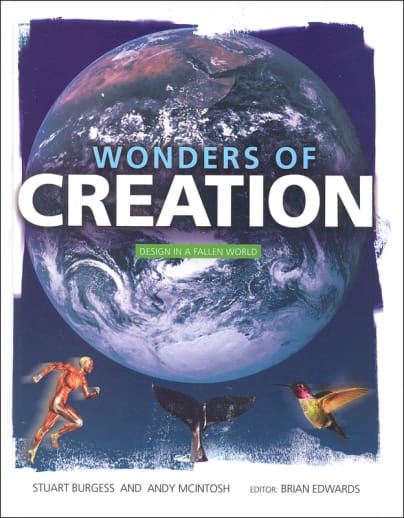This encyclopedia by Master Books is a colorful and informative resource showing us our intricate universe as it points us to evidence for God as Creator. The page layout, illustrations and text make this an enjoyable and easy book to read with so many interesting details. The fourteen chapters focus on land mammals, sea creatures, birds and insects, stars and planets, mathematics, mankind, and much more. If you are also looking for a Christian supplementary resource for your science curriculum, this would be an excellent option! ~ Gina
Wonders of Creation
SKU
049820
ISBN
9781683441663
Grade 3-AD
Christian/Religious
Non-Consumable
These icons are designed to help you quickly understand and learn important information about our products.
Teaching Method
Traditional
Teacher-centered curriculum commonly used in classrooms that may include a text, teacher manual, tests, etc.
Charlotte Mason
A methodology based on the work of a 19th century educator who maintained that children learn best from literature (Living Books), not textbooks.
Classical
A methodology based on the Latin Trivium (three stages of learning), including the grammar stage (memorization and facts), logic stage (critical thinking), and rhetoric stage (developing/defending ideas).
Unit Study
A thematic or topical approach centered around one topic that integrates multiple subject areas.
Montessori (Discovery)
A methodology based on the work of a 20th century educator that emphasizes student and sensory-driven discovery learning and real-life applications.
Other
Other methodologies
Religious Content
Secular
Contains content contrary to common Christian beliefs (i.e. evolution).
Neutral
Avoids religious or theoretical topics or presents multiple viewpoints without preference.
Christian/Religious
Faith-based or including instructional religious content.
Learning Modality
Auditory
Learns through listening, talking out loud or reading out loud.
Visual
Learns through seeing, prefers written instructions and visual materials.
Kinesthetic/Tactile (Hands-On)
Learns through moving, doing and touching.
Multi-Sensory
Curriculum that employ a variety of activities/components.
Presentation
Sequential
Curriculum progresses through well-defined learning objectives. Emphasizes mastery before moving to the next topic.
Spiral
Topics and concepts are repeated from level to level, adding more depth at each pass and connecting with review.
Conceptual/Topical
Focus is on the “why,” often with a unifying concept as well as specific skills; coverage may be broader.
Teacher Involvement
Low Teacher Involvement
Student-led materials; parent acts as a facilitator.
Medium Teacher Involvement
A mix of teacher-led time and independent student work.
High Teacher Involvement
Teacher-led lessons; may utilize discussions, hands-on activities and working together.
Additional Materials Required
No other materials needed
Everything you need is included.
Other Materials Required
There are additional required resources that are a separate purchase.
Other Materials Optional
There are additional resources mentioned or recommended but are not absolutely necessary.
Consumable
Consumable
Designed to be written in; not reusable.
Non-Consumable
Not designed to be written in; reusable.
Our Price
$34.99 $34.99 $27.99
Rainbow Savings: $7.00
Description
Publisher's Description of Wonders of Creation
Enjoy the panorama of a Creation so beautifully detailed, ordered and complex that it would be unbelievable if it was not there in front of us. As you look at the world around you, it is impossible not to experience the incredible awe and wonder of its design. Is this the result of an unlimited number of immeasurable odds or a more satisfying and reasonable explanation of a Creator? What is the purpose of it all?
Includes full-color images and details of:
Details
| Product Format: | Hardcover |
|---|---|
| Grades: | 3-AD |
| Brand: | Master Book Publishers |
| ISBN: | 9781683441663 |
| Length in Inches: | 11.125 |
| Width in Inches: | 8.75 |
| Height in Inches: | 0.75 |
| Weight in Pounds: | 2.65 |
Videos
Reviews

